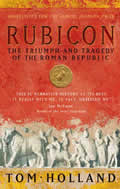 by Tom Holland
by Tom Holland
The fall of the Roman Republic has gotten a lot of attention recently, with ABC and HBO both producing series on the subject. The Founders were intimately familiar with the story, and tried to frame the Constitution, both in federalism and in the national government’s balance of powers, to make this republic more durable. Perhaps out of a sense of our own non-drift towards empire, but also perhaps out of a growing concern for the fragility or vulnerability of our own institutions of government, the period continues to fascinate. Indeed, the lessons may be legion.
While the phrase “crossing the Rubicon” is part of our language, and my guess is that a good 10% of high school students can vaguely recall “Et tu, Brutus,” the story is much longer than most people realize. Caesar didn’t cross the river until 49 BCE, but violence first appeared in domestic Roman politics 80 years earlier, with the murders of the brothers Gracchi, populists who advocated a program of land redistribution and equalization.
It helps to understand the political culture of the Republic. While the election system guaranteed that a patrician’s vote would count more than a plebian’s. universal citizenship still gave everyone a stake in the city, and created certain universal expectations. It was expected that a successful and ambitious Roman would eventual test himself in the political arena.
Since the politicians rarely differed on policy, the contests were a more reflection of individual ambition and popularity than of a given program. (Anyone with experience in academia can attest to the bitterness of battles with low stakes between large egos and strong personalities.) To some extent, this changed when the parties morphed into Caesar’s party and a Constitutional party, but when every election is a referendum on the very forms of government, the battle is already almost lost.
In addition, while there were plenty of offices, the rules governing them were numerous, and the path to advancement fairly narrow. The offices were organized to disperse rather than concentrate power, with strict term limits. The pretense for killing the Gracchi was that they had succeeded themselves as tribunes, which was supposed to be forbidden. So the first use of political violence was justified on the grounds that it was preserving the Republic’s institutions. That would be the recurring pattern. From the murder of the Gracchi, to Sulla’s depredations, to Brutus et. al. making up for Pompey’s failure.
These institutions weren’t able to survive, because the value of the prize eventually outweighed the supporting structures. It was only necessary to win the citizens of the city of Rome to win control of the Republic and its possessions. But the wealth and means of doing that, or of enforcing one’s will, came from military conquest and tax farming.
When the Republic was small, Rome occupied a much larger percentage of its wealth and population, and that population was much more engaged politically and aware of the requirements of citizenship. As the Republic’s possessions grew, the resources of half the empire were brought to bear on individual offices, and the insecure rabble of a single city. Even Caesar’s wife couldn’t resist that sort of temptation.
In fact, the decline of the Republic is really the crossing of a series of psychological and symbolic barriers, as much as physical ones. As each previously inviolable line is crossed, the resistance to the next one is weakened, and the question becomes when, not if, it would fall to a sufficiently ambitious and ruthless man. In this sense, the Rubicon isn’t unique so much as representative of a process.
The story has certainly been told before, but Holland keeps the number of characters to a minimum, a requirement in a popular history of this kind. This keeps the focus on the great personalities, and their constituencies, rather than losing us in a maze of court intrigue. His writing is solid, if not striking. Rubicon is also well-edited. I never found myself asking if I had just read that sentence, or flipping back because of some obvious omission.
The one quibble I’d have is with Holland’s equation of the tax farmers with “big business.” While this might have been the biggest business around, patronage and government favors hardly equate with a capitalist, market-driven system tied to production.
In the end, Rome wasn’t merely betrayed by its political class, but also by its non-political class, which forgot what citizenship meant. Rubicon covers somewhat familiar ground, but the lessons of how political liberty can slowly bleed away are as relevant to us as ever.